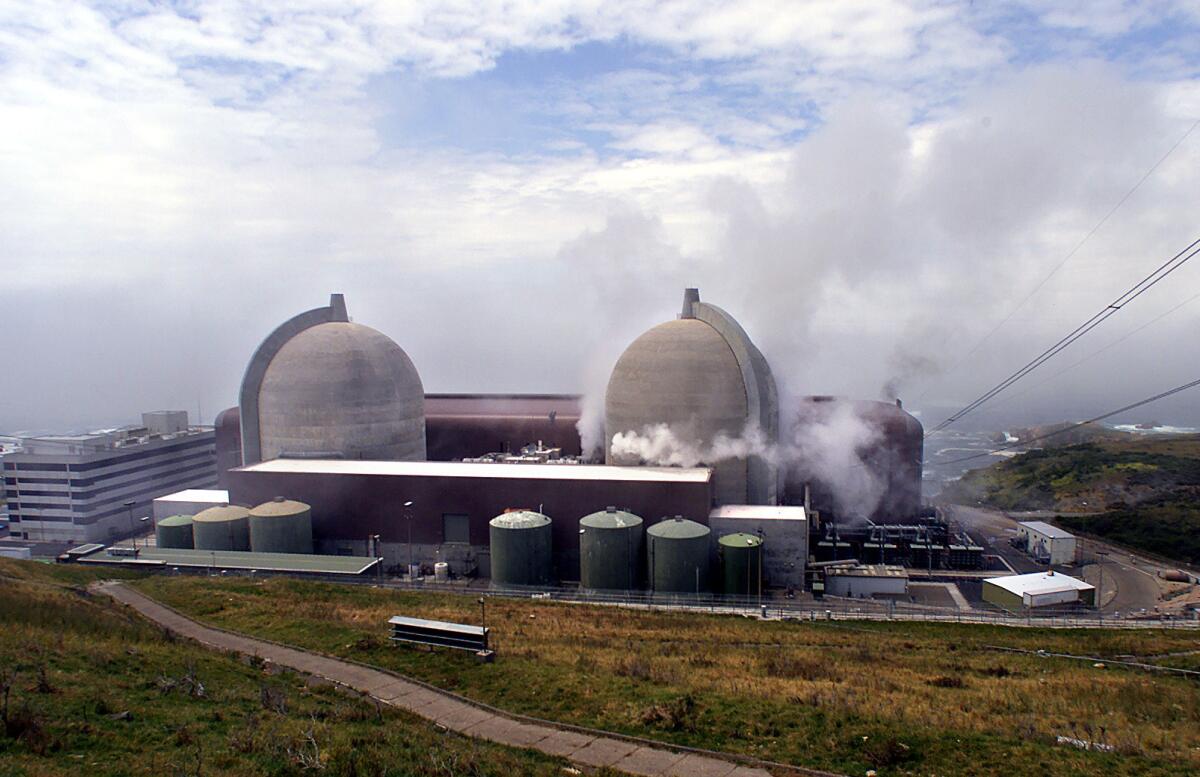Regulator should recuse itself from deciding Diablo Canyon nuclear plant’s fate, group says

A pro-nuclear environmental group wants the California Public Utilities Commission to step aside from considering whether to approve a proposal that would lead to the shutdown of the last remaining nuclear power plant in the state, saying the agency is too riven with controversy to make a fair ruling.
Instead, the Berkeley-based group called Environmental Progress filed a motion Wednesday urging the commission to hand over the fate of the Diablo Canyon nuclear plant to the Legislature.
“The CPUC should not do anything on this proposal because it is in a crisis of legitimacy,” said Michael Shellenberger, president of Environmental Progress. “We’re arguing for a legislative remedy that encompasses the full reform that this agency in crisis needs, which may include [the commission] just getting disbanded.”
The commission offered little comment on the 20-page motion by Environmental Progress. “We will consider the motion and respond as appropriate,” spokesman Christopher Chow said in an email.
But Pacific Gas & Electric Co., the investor-owned utility that operates Diablo Canyon, said it was confident the commission’s process of considering the proposed shutdown will be “open and transparent.”
“The motion filed by Environmental Progress would only unnecessarily delay this public process,” PG&E spokesman Blair Jones said in an email, adding that the utility intends to oppose the motion.
By its own admission, the commission is under two criminal investigations, including one by the state attorney general’s office. It also has run up more than $12 million in legal bills to answer subpoenas, search warrants and other demands on its regulators related to their dealings with energy executives.
The commission has hired outside lawyers to process demands for emails and other records related to a 2010 natural-gas explosion in San Bruno that killed eight people and to the 2012 failure of the San Onofre nuclear plant in San Diego County.
State agents are examining a secret March 2013 meeting in Warsaw between former commission president Michael Peevey and an executive from Southern California Edison, where an early framework was established to take care of $4.7 billion in premature-closure costs for the San Onofre plant.
The deal ended up assigning 70% of those costs to customers, rather than to shareholders of Edison and co-owner San Diego Gas & Electric.
Regulators announced in May that the commission was reopening the San Onofre plant’s cost settlement.
Peevey’s home was raided in early 2015, with investigators seizing computers and other items.
A bill aimed at overhauling the commission died in the legislative session in Sacramento that ended Aug. 31, although two other pieces of legislation calling for changes managed to get through.
The commission has also been involved in a court battle over approximately 60 San Onofre-related emails between regulators and the office of Gov. Jerry Brown that the commission has been withholding.
“There’s a set of unanswered questions” around the San Onofre settlement “that involves parties to this [proposed] settlement involving Diablo Canyon,” Shellenberger said.
On June 20, PG&E filed a proposal with the commission calling for Diablo Canyon to be completely phased out by 2025. PG&E was joined by a number of labor and environmental groups approving of the closure.
Under the plan, PG&E would make up for the loss of electrical power generated at Diablo Canyon through a combination of greater contributions from renewable energy sources, energy efficiency and energy storage.
PG&E also anticipates its power burden will decrease over time as more of its customers switch from a big utility model to community-choice aggregation, which allows local governments to pool their electricity load.
“The benefit of the joint proposal is it tries to give PG&E and the state nine years to deal with the replacement,” said John Geesman, attorney for the Alliance for Nuclear Responsibility, one of four environmental groups that signed on with PG&E.
Environmental Progress has been a sharp critic of the proposed shutdown, saying the elimination of nuclear power will make the state even more reliant on natural gas.
Shellenberger called the move to get the PG&E joint proposal approved a “rush job,” which PG&E officials deny.
The motion filed Wednesday mentioned that Geesman and Peevey talked to each other when the San Onofre settlement was being considered.
In a later interview, Geesman said the two men discussed setting up a research group to look into the effects of greenhouse gas emissions.
In Wednesday’s motion, Environmental Progress said Geesman did not properly disclose that part of the discussion — called an ex parte communication between a commissioner and outside parties — in a separate filing.
Geesman dismissed the claim in a telephone interview Thursday.
“I did file the required ex parte disclosure,” Geesman said. “Under the PUC rules, you are not supposed to disclose what the PUC decision-maker [Peevey] said, only what you said.”
Of the Environmental Progress filing, Geesman said, “I’m not sure if I’d call it a motion or a press release.”
Shellenberger said his group’s call for the commission to essentially recuse itself from the Diablo Canyon decision and have the Legislature take over is not a long shot.
“I am confident that when the elected representatives of the California people understand what is in our motion, and really read the evidence, they will seek even stronger reforms and perhaps even an abolishment of the CPUC,” he said.
rob.nikolewski@sduniontribune.com
ALSO
VW engineer from Southern California pleads guilty in emissions cheating scandal
No flying Tesla? That’s because electric planes are a steeper challenge than electric cars
How Stephen Cheung went from cutting threads in a sweatshop to cutting global trade deals
More to Read
Inside the business of entertainment
The Wide Shot brings you news, analysis and insights on everything from streaming wars to production — and what it all means for the future.
You may occasionally receive promotional content from the Los Angeles Times.










